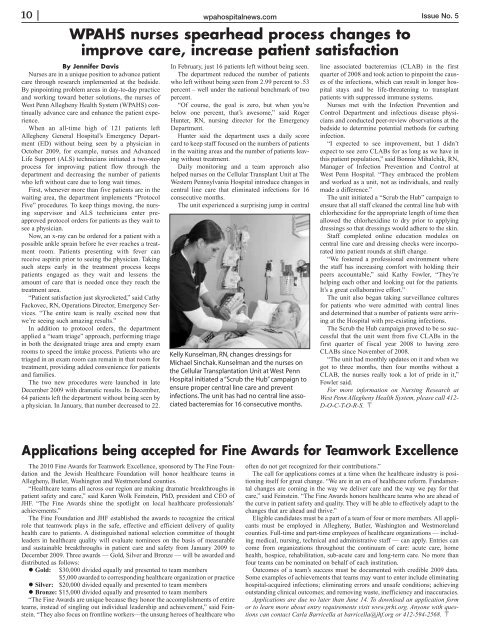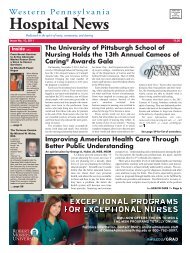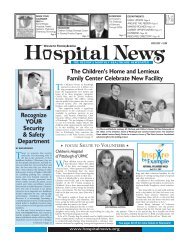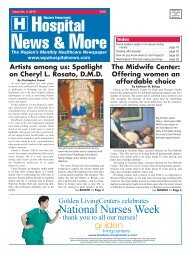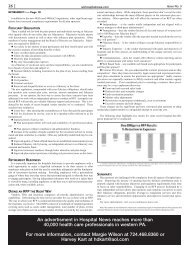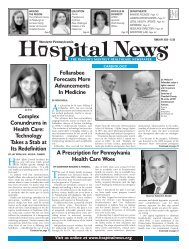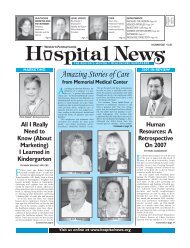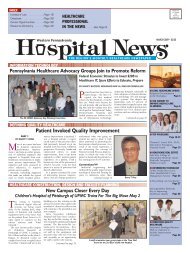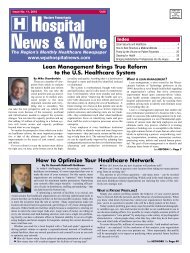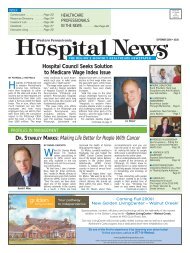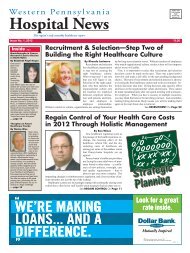McKeesport Hospital Foundation holds 33rd annual Invitational ...
McKeesport Hospital Foundation holds 33rd annual Invitational ...
McKeesport Hospital Foundation holds 33rd annual Invitational ...
Create successful ePaper yourself
Turn your PDF publications into a flip-book with our unique Google optimized e-Paper software.
10 | wpahospitalnews.comIssue No. 5WPAHS nurses spearhead process changes toimprove care, increase patient satisfactionBy Jennifer DavisNurses are in a unique position to advance patientcare through research implemented at the bedside.By pinpointing problem areas in day-to-day practiceand working toward better solutions, the nurses ofWest Penn Allegheny Health System (WPAHS) continuallyadvance care and enhance the patient experience.When an all-time high of 121 patients leftAllegheny General <strong>Hospital</strong>’s Emergency Department(ED) without being seen by a physician inOctober 2009, for example, nurses and AdvancedLife Support (ALS) technicians initiated a two-stepprocess for improving patient flow through thedepartment and decreasing the number of patientswho left without care due to long wait times.First, whenever more than five patients are in thewaiting area, the department implements “ProtocolFive” procedures. To keep things moving, the nursingsupervisor and ALS technicians enter preapprovedprotocol orders for patients as they wait tosee a physician.Now, an x-ray can be ordered for a patient with apossible ankle sprain before he ever reaches a treatmentroom. Patients presenting with fever canreceive aspirin prior to seeing the physician. Takingsuch steps early in the treatment process keepspatients engaged as they wait and lessens theamount of care that is needed once they reach thetreatment area.“Patient satisfaction just skyrocketed,” said CathyFackovec, RN, Operations Director, Emergency Services.“The entire team is really excited now thatwe’re seeing such amazing results.”In addition to protocol orders, the departmentapplied a “team triage” approach, performing triagein both the designated triage area and empty examrooms to speed the intake process. Patients who aretriaged in an exam room can remain in that room fortreatment, providing added convenience for patientsand families.The two new procedures were launched in lateDecember 2009 with dramatic results. In December,64 patients left the department without being seen bya physician. In January, that number decreased to 22.In February, just 16 patients left without being seen.The department reduced the number of patientswho left without being seen from 2.99 percent to .53percent – well under the national benchmark of twopercent.“Of course, the goal is zero, but when you’rebelow one percent, that’s awesome,” said RogerHunter, RN, nursing director for the EmergencyDepartment.Hunter said the department uses a daily scorecard to keep staff focused on the numbers of patientsin the waiting areas and the number of patients leavingwithout treatment.Daily monitoring and a team approach alsohelped nurses on the Cellular Transplant Unit at TheWestern Pennsylvania <strong>Hospital</strong> introduce changes incentral line care that eliminated infections for 16consecutive months.The unit experienced a surprising jump in centralKelly Kunselman, RN, changes dressings forMichael Sinchak. Kunselman and the nurses onthe Cellular Transplantation Unit at West Penn<strong>Hospital</strong> initiated a “Scrub the Hub” campaign toensure proper central line care and preventinfections. The unit has had no central line associatedbacteremias for 16 consecutive months.line associated bacteremias (CLAB) in the firstquarter of 2008 and took action to pinpoint the causesof the infections, which can result in longer hospitalstays and be life-threatening to transplantpatients with suppressed immune systems.Nurses met with the Infection Prevention andControl Department and infectious disease physiciansand conducted peer-review observations at thebedside to determine potential methods for curbinginfection.“I expected to see improvement, but I didn’texpect to see zero CLABs for as long as we have inthis patient population,” said Bonnie Mihalchik, RN,Manager of Infection Prevention and Control atWest Penn <strong>Hospital</strong>. “They embraced the problemand worked as a unit, not as individuals, and reallymade a difference.”The unit initiated a “Scrub the Hub” campaign toensure that all staff cleaned the central line hub withchlorhexidine for the appropriate length of time thenallowed the chlorhexidine to dry prior to applyingdressings so that dressings would adhere to the skin.Staff completed online education modules oncentral line care and dressing checks were incorporatedinto patient rounds at shift change.“We fostered a professional environment wherethe staff has increasing comfort with holding theirpeers accountable,” said Kathy Fowler, “They’rehelping each other and looking out for the patients.It’s a great collaborative effort.”The unit also began taking surveillance culturesfor patients who were admitted with central linesand determined that a number of patients were arrivingat the <strong>Hospital</strong> with pre-existing infections.The Scrub the Hub campaign proved to be so successfulthat the unit went from five CLABs in thefirst quarter of fiscal year 2008 to having zeroCLABs since November of 2008.“The unit had monthly updates on it and when wegot to three months, then four months without aCLAB, the nurses really took a lot of pride in it,”Fowler said.For more information on Nursing Research atWest Penn Allegheny Health System, please call 412-D-O-C-T-O-R-S.Applications being accepted for Fine Awards for Teamwork ExcellenceThe 2010 Fine Awards for Teamwork Excellence, sponsored by The Fine <strong>Foundation</strong>and the Jewish Healthcare <strong>Foundation</strong> will honor healthcare teams inAllegheny, Butler, Washington and Westmoreland counties.“Healthcare teams all across our region are making dramatic breakthroughs inpatient safety and care,” said Karen Wolk Feinstein, PhD, president and CEO ofJHF. “The Fine Awards shine the spotlight on local healthcare professionals’achievements.”The Fine <strong>Foundation</strong> and JHF established the awards to recognize the criticalrole that teamwork plays in the safe, effective and efficient delivery of qualityhealth care to patients. A distinguished national selection committee of thoughtleaders in healthcare quality will evaluate nominees on the basis of measurableand sustainable breakthroughs in patient care and safety from January 2009 toDecember 2009. Three awards — Gold, Silver and Bronze — will be awarded anddistributed as follows: Gold: $30,000 divided equally and presented to team members$5,000 awarded to corresponding healthcare organization or practice Silver: $20,000 divided equally and presented to team members Bronze: $15,000 divided equally and presented to team members“The Fine Awards are unique because they honor the accomplishments of entireteams, instead of singling out individual leadership and achievement,” said Feinstein.“They also focus on frontline workers—the unsung heroes of healthcare whooften do not get recognized for their contributions.”The call for applications comes at a time when the healthcare industry is positioningitself for great change. “We are in an era of healthcare reform. Fundamentalchanges are coming in the way we deliver care and the way we pay for thatcare,” said Feinstein. “The Fine Awards honors healthcare teams who are ahead ofthe curve in patient safety and quality. They will be able to effectively adapt to thechanges that are ahead and thrive.”Eligible candidates must be a part of a team of four or more members. All applicantsmust be employed in Allegheny, Butler, Washington and Westmorelandcounties. Full-time and part-time employees of healthcare organizations — includingmedical, nursing, technical and administrative staff — can apply. Entries cancome from organizations throughout the continuum of care: acute care, homehealth, hospice, rehabilitation, sub-acute care and long-term care. No more thanfour teams can be nominated on behalf of each institution.Outcomes of a team’s success must be documented with credible 2009 data.Some examples of achievements that teams may want to enter include eliminatinghospital-acquired infections; eliminating errors and unsafe conditions; achievingoutstanding clinical outcomes; and removing waste, inefficiency and inaccuracies.Applications are due no later than June 14. To download an application formor to learn more about entry requirements visit www.prhi.org. Anyone with questionscan contact Carla Barricella at barricella@jhf.org or 412-594-2568.


